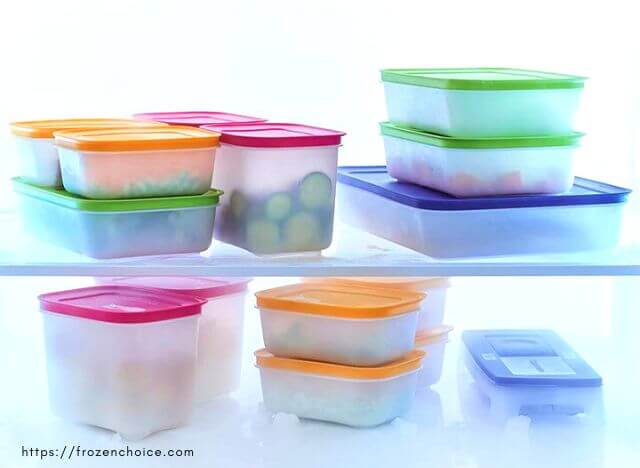Tupperware is an excellent product for handling leftovers or storing fresh food in the freezer. However, certain items are not suitable for freezing because of their adverse reaction when exposed to shallow temperatures. As a result, many people are also worried about freezing Tupperware. Is Tupperware safe for freezer?
This article will prove that you don’t need to worry about that and provide you with information about Tupperware.
Tupperware
Tupperware is a famous American brand established in 1946, the Tupperware Brands corporation headquartered in Orlando, Florida. This brand specializes in manufacturing and supplying kitchen products and household appliances, especially plastic containers for food preservation.
In addition, the corporation also develops many other product lines such as water purifiers, cosmetics, supplementary food, …
Currently, Tupperware has more than 16 factories located in many countries around the world and is one of the best food container brands trusted and preferred by consumers.
In food preservation, it has launched many different product lines to the market.
- Take-away boxes: food containers, salad bowls, water bottles, …
- Kitchen tools: kitchen fresh or dry food storage containers, rice bins, ….
- Refrigerator box series: fridge and freezer containers, …
- Product lines for processing and cooking: plastic containers for warming in the microwave, baby feeding bottles, steaming pots, …
Is Tupperware freezer safe?
Tupperware is an item to help people preserve foods longer and more efficiently. The material of Tupperware products is very diverse, basically plastic and glass. These two materials are studied to be very good for extending the shelf life of food with refrigerators and freezers.
If you’re concerned about reactions occurring during the freezing process of Tupperware that could affect the quality of your food, don’t worry. Tupperware is made to protect your food. Whether with glass or plastic Tupperware, you don’t have to worry about using it for frozen storage.
Tupperware products are researched to be as suitable as possible under different conditions for food packaging and storage, including freezing. Tupperware containers work well in the freezer when you store food, helping to maximize shelf life, improve the quality of frozen food, and prevent odors in the freezer.
Decoding Tupperware symbols
Food safe
Tupperware products that are generally considered food safe if you see the symbol of a fork and wine glass engraved into the plastic. Most of your Tupperware is completely food safe. Check it out yourself to make sure it’s safe for your food.
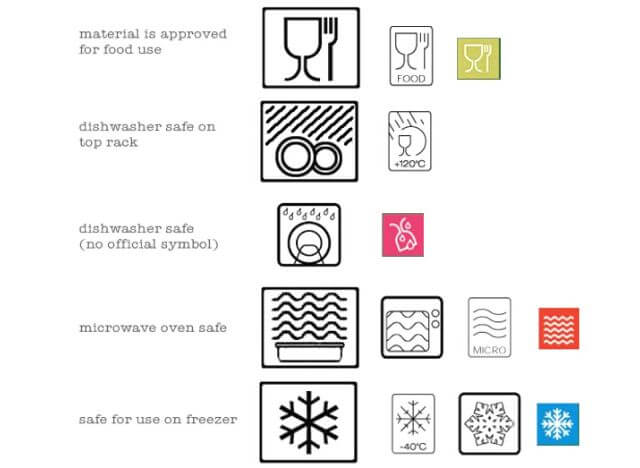
Dishwasher safe
It’s very useful if you get in the habit of checking that your containers, utensils, and other kitchen items are dishwasher safe.
To see if Tupperware is dishwasher safe, look for the icon of dishes or a glass being sprayed by water. However, most current products are made to be dishwasher safe.
Freezer safe
If your Tupperware container has a snowflake symbol on it, it means it’s freezer safe. If you don’t see the snowflake icon, avoid putting your new containers in the freezer. Excessive heat can damage the plastic, and if the container is not food safe, this can cause chemicals to spread into the food when the container is taken out of the freezer.
Microwave safe
The scribbles on your Tupperware mean it’s safe to put in the microwave.
Recycle information
There are different types of plastics that are numbered from one to seven. Not all plastics are recyclable. If you find the triangle made of arrows, it means the product is recyclable. Most Tupperware are made with plastic number 5, which is polypropylene, generally a food safe plastic.
Is it safe to freeze food in Tupperware?
Thanks to the high-quality material with a tight-fitting lid and air cannot enter, the container can prevent food from spoiling. Therefore, the preservation ability of Tupperware is extremely good.
Generally, freezing food in Tupperware is safe. In fact, freezing food is one of the safest ways to keep food from spoiling or contracting food-borne illnesses. Freezing makes the pathogenic bacteria or microorganisms to become inactive.
However, freezing food in Tupperware is only safe when your freezer is at the right freezing temperature, 0 F degree or -18 C degree.
You should also note that improper freezing method has negative consequences in terms of taste, color, and consistency. When food is exposed to air, it can cause freezer burn which dries out foods and creates an unappetizing texture or flavor. To avoid freezer burn, using Tupperware containers with lids is a wise choice.
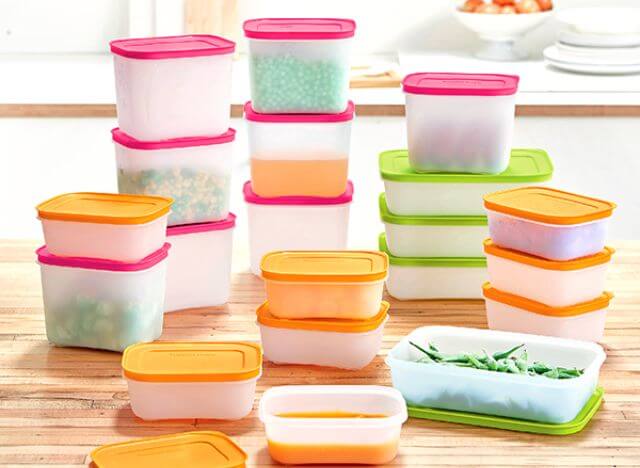
Freeze food in glass Tupperware
Being versatile and durable, glass Tupperware is best choice for freezing most foods. However, you should consider the type of glass Tupperware.
It’s best to choose tempered glass for best results. Also, be sure to choose a jar of high quality and thick enough, otherwise the glass container may be at risk of breakage.
Before placing in the freezer, wait for the Tupperware to cool to room temperature or colder. If you put warm or hot glass in the freezer, it will break.
Also, keep in mind that most liquids expand when frozen, so leave some room on top of your food when freezing with Tupperware.
Freeze food in plastic Tupperware
Most housewives find it safe to freeze food in plastic Tupperware as it is an easy and safe method of preserving most frozen foods. When choosing a plastic container, choose one that is freezer safe. The thicker plastics are usually an indication that they are safer in the freezer.
When using take-away containers, there is a risk that they will crack or break.
It is also important to choose a plastic Tupperware with a tight-fitting lid. Plastic Tupperware lids are important to prevent freezer burn and keep food fresher for longer.
Is glass Tupperware better than plastic Tupperware?
When it comes to food containers, glass and plastic are the two most used materials. Which type will you choose? In addition to purpose (for food storage or freezing), personal preference, there are other concerns such as: environment, safety, storing space and weight as well as functionality.
For freezing food
Glass is a natural, sustainable and recyclable material. It’s also more hygienic as it can withstand heat more easily than plastic, which means it’s easier to clean.
When freezing, if you use glass Tupperware, you can be sure that your food won’t be contaminated with harmful chemicals. Glass container keep food stay fresh for longer in the freezer.
Although glass Tupperware is heavier and more fragile, it is generally a better choice for freezing.
For food storage
Glass Tupperware is better if you care about the following things:
- Protect the environmental: Recyclability is a prominent feature of glass. If you’re careful, glass containers will last almost indefinitely, and if you throw them away, they’re 100% recyclable. Meanwhile, not all plastics can be recycled.
- Protect your health: Even if the plastic is declared BPA-free, a number of other harmful chemicals can get into your food during microwave baking or freezing. Glass can be safe at high temperatures. Most food containers made of glass are designed to withstand high heat without breaking.
- Saving space and aesthetics: With other purposes like storing leftovers in the fridge or freezer, you have small space saving or want something look beautiful, glass is considered a better option.
Plastic Tupperware is best when you:
- Bring your lunch to work: Plastic containers are definitely a convenient choice for transporting food.
- Pack your kids’ lunches: If you use a box for your child to bring lunch to school, then plastic is best as it is not broken, safe for kids.
Benefits of using Tupperware in the freezer
There are many reasons to choose Tupperware to freeze your food. The main reason is its quality and durability. Besides, Tupperware brings other benefits when freezing food.
Tupperware maximizes space inside the freezer as it is designed to be easily stacked without worrying about damage or breakage. Besides, this makes it easy to get the food you want when you need it.
With designs in various shapes and sizes, Tupperware gives users a variety of options to flexibly use with different conditions of their freezer. In every form, Tupperware produces a variety of sizes.
In particular, the low number of gallons in Tupperware helps you freeze food evenly and without spoiling because of its ability to keep the temperature stable. When using Tupperware, you don’t need to worry about the freezer being contaminated with food or one food being contaminated by another.
If you care about the environment, Tupperware will be the solution for you to reduce your daily waste. You only need to wash to reuse Tupperware boxes.
Notes when using Tupperware to freeze food
Tupperware is straightforward to use. However, to achieve optimal results when using this item, you should pay attention to a few things:
Close the lid tightly
One thing that is particularly important in determining the quality of a freezer is maintaining an airtight and wind-tight interior space. Therefore, when using Tupperware, you should pay attention to choosing a box with a good and tight lid. Tupperware’s best covers include thick plastic lids and mason jar lids.
Pour just enough food
Food will expand or contract when exposed to heat. You should only fill the can with food about 1 inch from the mouth of the can. If you overfill, the lid of the Tupperware can expand and pop out automatically.
Make notes on Tupperware
Many people who preserve food often forget its use and storage time, which makes it easy for users to eat foods that have been frozen for too long, affecting digestion. Therefore, you should note the storage time on Tupperware to avoid forgetting and using it properly.
Alternatives to Tupperware
Ziploc bag
Sealed plastic bags, like Ziploc bags, are a great alternative to Tupperware. You can use them to stockpile frozen soups, prepared frozen meals, or chopped vegetables. Because they seal very well and create an airtight space easily. You’ll keep your freezer organized because they can be stored flat and stacked.
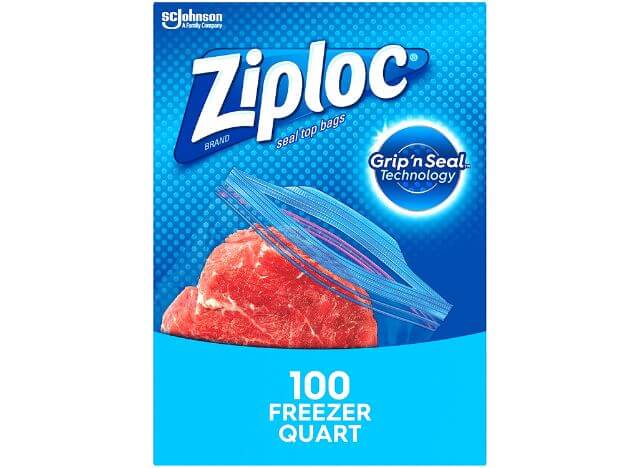
Vacuum sealing
Using a vacuum sealer to cover food for freezing is a great alternative to Tupperware.
Further reading: Which is the Best Vacuum Sealer to Keep Food Fresh?
Silicone containers
Silicone containers are quite similar to Tupperware containers in terms of usage, they are just made of silicone instead of plastic. This can be a perfect alternative.
Aluminum foil
Aluminum foil is an acceptable option, it is not the best choice for freezing foods. It doesn’t have an airtight space when storing frozen foods, so it won’t keep food as long as other options.
Tiny tip for better freezing: You can simply vacuum seal the entire Tupperware container to make frozen food in Tupperware much more efficient.
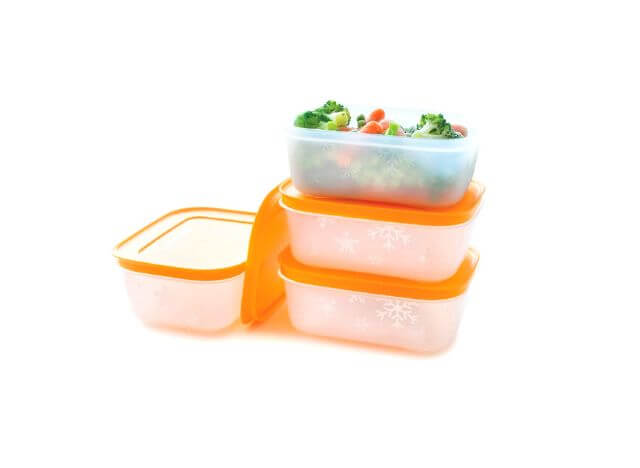
Never forget this
When you use the wrong kind of items for cold storage, negative consequences on the taste and texture of the food will occur. In particular, when frozen food is in contact with air, it will easily cause freezer burn because the food changes directly from ice to steam, bypassing the phenomenon of turning into liquid.
Although Tupperware is made to preserve food, some types of Tupperware are not too suitable for freezer storage. Therefore, you should consider the following things to determine if your Tupperware will work well with your freezer:
- Tupperware surface is easy to label and note to mark the freezing time of food
- It does not crack or degrade when exposed to low temperatures
- Sealed lid, leak-proof and moisture-proof
- For the convenience of cleaning, you should choose grease-proof materials
- Not too thin to avoid absorbing the odors of other foods inside
- Choose Tupperware that makes it easy to open and close the box
With freezing, you should choose Tupperware in thick plastic or glass. The box needs to be sealed and not let the air out.
Conclusion
Many people love Tupperware for its safety and convenience when storing frozen foods. The boxes from this brand create a great solution to prevent freezer burn while helping users protect the environment significantly. However, you should be aware of some issues when using Tupperware for maximum efficiency.
Reference
Plastic vs. glass: Which food storage container makes sense for you, 21oak.com, Retrieved on Jun. 22, 2022

